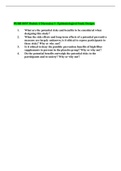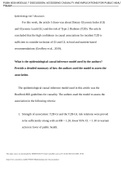Pubh 8035 discussion - Study guides, Class notes & Summaries
Looking for the best study guides, study notes and summaries about Pubh 8035 discussion? On this page you'll find 11 study documents about Pubh 8035 discussion.
All 11 results
Sort by
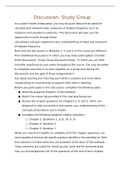
-
PUBH 8035 Module 2 Discussion; Study Group
- Other • 28 pages • 2022
- Available in package deal
-
- $12.49
- + learn more
As a public health professional, you may be given data and be asked to calculate and interpret basic measures of disease frequency such as incidence and prevalence statistics. This Discussion will give you the opportunity to work through these calculations and gain experience and understanding of these key measures of disease frequency. Note that the discussions in Modules 2, 3, and 5 of this course are different than traditional Discussions in which you may have participated. Consider these d...
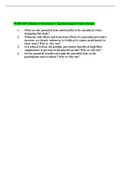
-
PUBH 8035 Module 4 Discussion 1; Epidemiological Study Designs
- Other • 3 pages • 2022
- Available in package deal
-
- $12.49
- + learn more
1. What are the potential risks and benefits to be considered when designing this study? 2. When the side effects and long-term effects of a potential preventive measure are largely unknown, is it ethical to expose participants to these risks? Why or why not? 3. Is it ethical to deny the possible prevention benefits of high-fiber supplements to persons in the placebo group? Why or why not? 4. Do the potential benefits outweigh the potential risks to the participants and to society? Why or why...
PUBH8035 Module 4 Discussion 1; Epidemiological Study Designs
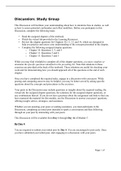
-
PUBH 8035 Module 5 Discussion; Study Group
- Other • 7 pages • 2022
- Available in package deal
-
- $12.49
- + learn more
ThisDiscussionwillfacilitate yourunderstandingabouthowtominimizebiasinstudies,aswellas how to assess potential confounders and effect modifiers. Before you participate in thisDiscussion,completethefollowingtasks: • Readtheassignedchaptersofthetextbook. • WatchthevirtuallabprovidedintheLearningResources. • ReviewthechapterquestionsforChapters10,11,13,and14,whicharedesignedtohelpyoupracticeandassessyourunderstandingoftheconcepts presentedinthechapter. • Completethefollowingassignedch...
PUBH 8035 Module 7 Discussion; Assessing Causality And Implications For Public Health Policy
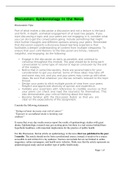
-
PUBH 8035 Module 1 Discussion; Epidemiology in the News
- Other • 7 pages • 2022
- Available in package deal
-
- $12.49
- + learn more
DiscussionTips Part of what makes a discussion a discussion and not a lecture is the back and forth, indepth, animated engagement of at least two people. If you start discussing a topic andyour peers are not engaging in it, consider what you can do to get the conversationgoing. Include something that might elicit further thoughts and different opinions amongyourpeers.Rememberthatdiscussionsupportsadiscovery-basedlearningexperiencethat facilitates a deeper understanding of content from multipl...
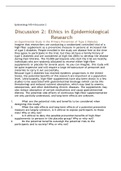
-
PUBH 8035 Module 4 Discussion 2; Ethics in Epidemiological Research
- Other • 5 pages • 2022
- Available in package deal
-
- $12.49
- + learn more
AnExperimentalStudyinthePrimaryPreventionofType2DiabetesImaginethatresearchersareconductingarandomizedcontrolledtrialofahigh-fibersupplementasapreventivemeasureinpersonsatincreasedriskoftype2diabetes. Peopleenrolledin thestudyaredisease-freeatthetime theyagreetoparticipateinthetrial,buttheyallhaveafamilyhistoryoftype2diabetesandareconsideredathigh-risk(80%)todevelopthediseaseduring their lifetime. The 10,000 participants who start the trial are healthyindividuals who are randomly allocated to r...
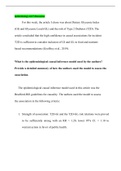
-
PUBH 8035 Module 7 Discussion; Assessing Causality and Implications for Public Health Policy
- Other • 4 pages • 2022
- Available in package deal
-
- $12.49
- + learn more
Forthisweek,thearticleIchosewasaboutDietaryGlycemicIndex(GI)and Glycemic Load (GL) and the risk of Type 2 Diabetes (T2D). The articleconcluded that the high confidence in causal associations for incident T2D issufficient to consider inclusion of GI and GL in food and nutrient-basedrecommendations(Geoffreyet al.,2019). What is the epidemiological causal inference model used by the authors?Provideadetailedsummaryofhowtheauthorsusedthemodeltoassesstheassociation.
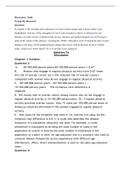
-
PUBH 8035 Module 3 Discussion; Study Group
- Other • 3 pages • 2022
- Available in package deal
-
- $12.49
- + learn more
StudyGroupMyResearchQuestion: In chapter 9, the strength and weaknesses of Case-control studies and Cohort studies werehighlighted. And one of the strengths of Case-Control studies is that it is efficient for rarediseases; in other words, conditions that are not common and epidemiologists are still trying tounravelthe nature ofthedisease(Aschengrau,2020).Ithought Covid-19shouldbepart ofsuchdiseases, but many of the epidemiologist studies that I have read in the past involves Cohortstudy,whileno...
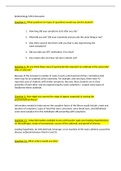
-
PUBH 8035 Module 6 Discussion; Study Group Outbreak Disease Detective
- Other • 2 pages • 2022
- Available in package deal
-
- $12.49
- + learn more
Question1:Whatquestions(ortypesofquestions)wouldyouaskthestudent? 1. Howlongdidyoursymptomsstartafteryouate? 2. Whatdidyoueat?Didyourroommateandyouatethesamethingornot? 3. Wasthereanyoneelsetherewithyouthatisalsoexperiencingthesamesymptoms? 4. DidyoutakeanyOTCmedication,ifsowhat? 5. Anyreasonwhyyouhavenotseenadoctoryet?

How much did you already spend on Stuvia? Imagine there are plenty more of you out there paying for study notes, but this time YOU are the seller. Ka-ching! Discover all about earning on Stuvia

